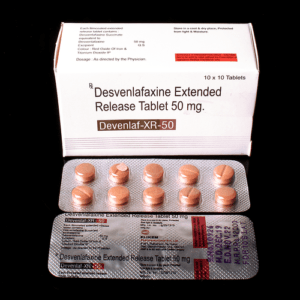Known as a serotonin and norepinephrine reuptake inhibitor, desvenlafaxine is an antidepressant that can be used to treat depression and anxiety. This drug works by blocking the reabsorption of these neurotransmitters in the brain, which increases their availability for use. By increasing levels of these two chemicals, it helps relieve symptoms such as feelings of sadness or hopelessness, excessive worry about things that may never happen, difficulty concentrating on tasks at hand, restlessness, or irritability.
Contents
What Is Desvenlafaxine?

Desvenlafaxine is a medication that can treat depression and anxiety. It belongs to a class of medications, serotonin, and norepinephrine reuptake inhibitors (SNRIs). Furthermore, desvenlafaxine helps to increase the levels of serotonin and norepinephrine in the brain. Furthermore, these are two chemicals that involve in mood regulation.
Working of Desvenlafaxine
- Desvenlafaxine works by blocking the reabsorption (reuptake) of serotonin and norepinephrine by the cells in the brain. This allows these chemicals to stay in the brain longer, which helps to improve mood.
- Desvenlafaxine is available as a tablet that you can take through the mouth. You can usually take it once per day, with or without food.
- Desvenlafaxine is also available as a sustained-release tablet that you can take once per day. This tablet releases the medication slowly over time. This allows gradual absorption into the bloodstream.
Directions To Use Desvenlafaxine
- Your doctor will prescribe the appropriate dose of desvenlafaxine based on your medical condition and response to treatment.
- The usual starting dose of desvenlafaxine is 50 mg per day, taken as either a tablet or sustained-release tablet. Your doctor may increase your dose gradually if needed.
- According to the prescription, take Desvenlafaxine orally with or without food, usually once daily. You can increase the dosage if there is a need.
What Does Desvenlafaxine Treat?
Desvenlafaxine treats a variety of diseases. Some of these are:
Depression
Depression is a condition in which a person feels sad and hopeless most of the time and has little interest or pleasure in activities. Some people with depression also have changes in their sleep patterns and eat less than usual. Desvenlafaxine can help to treat adults who have depression. It may take several weeks for desvenlafaxine to help improve mood symptoms.
Anxiety
Anxiety is a condition in which a person is worried, tense, or nervous about everyday things. Furthermore, desvenlafaxine can help to treat adults who have anxiety along with depression, or on its own. It may take several weeks for desvenlafaxine to help improve anxiety symptoms.
Generalized Social Anxiety Disorder
Generalized social anxiety disorder is a condition in which individual experiences persistent, intense, and chronic fear of being watched or judged by others. This can interfere with daily activities such as work or school due to the constant worry that people are looking at them. Desvenlafaxine may be used alone or along with other medications for adults who have a generalized social anxiety disorder.
Obsessive-compulsive Disorder (OCD)
Obsessive-compulsive disorder is characterized by having intrusive thoughts that cause distress and anxiousness followed by compulsions like checking things repeatedly, washing hands excessively, etc. However, these two factors together make it difficult for the person to function normally on a day to day basis making him/her live under stress most of the time. Desvenlafaxine may be used alone or along with other medications for adults who have OCD.
Side Effects of Desvenlafaxine
Like all medications, desvenlafaxine may cause side effects. Some of the most common side effects associated with desvenlafaxine include:
- headache
- nausea
- dizziness
- dry mouth
- constipation
- sleep problems (insomnia)
The majority of these side effects are mild and tend to go away over time. However, if you experience any severe or bothersome side effects, contact your doctor.
Considerations
- You should consult a doctor before taking the medicine. Take this medication as your doctor suggests. It is usually once daily with or without food. You can take this drug either on an empty stomach or along with a meal (low fat).
- Avoid chewing, breaking, opening the capsules, and pouring the contents directly into water or other beverages because it might lose effectiveness due to extensive exposure to air or moisture in these liquids.
- The dosage of Desvenlafaxine depends upon individual patient response & medical condition being treated; hence seek doctor’s advice prior to changing/modifying dose regimen.
- Evaluate symptoms regularly. This is even after improvement occurs so you can consider any changes in ongoing therapy.
Conclusion
This blog post discussed the use of Desvenlafaxine, a drug used for depression and anxiety. For those who have a major depressive disorder or anxiety disorder, this medication can be helpful. This helps in reducing symptoms to improve their quality of life. In general, you can take it twice per day at 50mg doses each time. Side effects are common but usually mild and manageable. You should not mix it with alcohol. This may lead to an unpleasant reaction such as nausea or vomiting due to its effect on liver enzymes. Patients using this medication should stay well hydrated by drinking plenty of fluids daily including water, milk, or juice without sugar added if possible because dehydration increases side effects like dizziness and drowsiness which could affect performance.
If you are looking for affordable Online Counseling MantraCare can help: Book a trial therapy session


